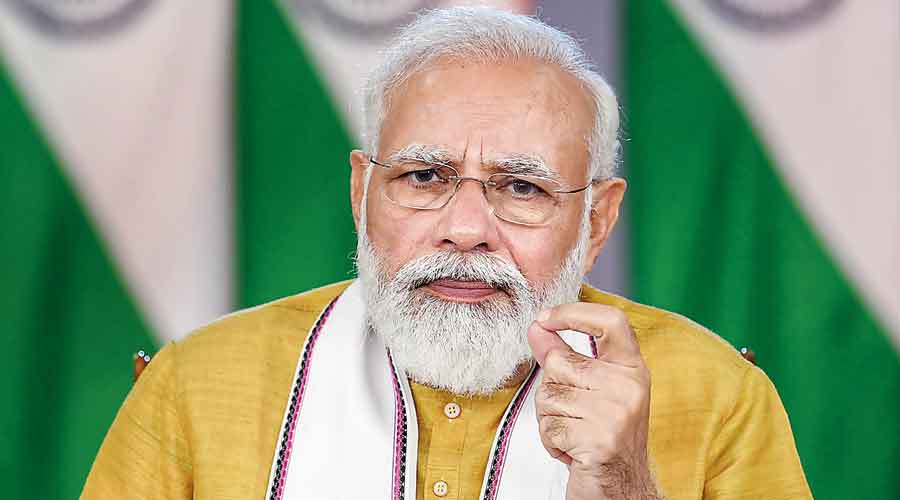Prime Minister Narendra Modi on Thursday called on democratic nations to ensure that cryptocurrency does not end up in the "wrong hands", and cautioned that new-age technologies have the potential to be used as instruments of conflict and domination.
In a virtual address at the Sydney Dialogue, he said India has created a robust framework of data protection, uses data as a source of empowerment of people and has unmatched experience in doing this in a democratic framework with strong guarantees of individual rights.
Modi said the democracies must invest together in the research and development of future technology, create trusted manufacturing base and supply chains and work for preventing "manipulation" of public opinions.
He said technology and data are becoming "new weapons" and whether all the "wonderful powers" of technology will be instruments of "cooperation or conflict", "coercion or choice" and "domination or development" will depend on choices the nations make.
The Sydney Dialogue is a forum focused on emerging, critical and cyber technologies.
Modi said the biggest strength of democracy is its openness and a few vested interests should not be allowed to misuse it, noting that the digital age has redefined politics, economies and societies besides raising new questions on sovereignty, governance, ethics, rights and security.
He said the like-minded countries should develop technical and governance standards and norms consistent with their democratic values and create standards and norms for data governance.
"It should also recognise national rights and, at the same time, promote trade, investment and larger public good. Take crypto-currency or bitcoin for example," he said.
"It is important that all democratic nations work together on this and ensure it does not end up in wrong hands, which can spoil our youth," he added.
There have been concerns in India over misleading claims of huge returns on cryptocurrency investment and its possible use for money laundering and terror financing. Last week, Modi chaired a meeting on the way forward on cryptocurrency or bitcoin.
Giving an overview of India's approach to new technologies, Modi said the country is investing in developing indigenous capabilities in diverse areas including in 5G and 6G for the telecom sector and is one of the leading nations in artificial intelligence (AI) and machine learning, especially in "human-centred" and ethical use of AI.
He said technology has already become a major instrument of global competition and key to shaping the future international order.
"We are at a historic moment of choice. Whether all the wonderful powers of technology of our age will be instruments of cooperation or conflict, coercion or choice, domination or development, oppression or opportunity," Modi said.
"India, Australia and our partners in the Indo Pacific region and beyond hear the call of our times. And, we are prepared to rise to fulfil our responsibilities," he added.
The prime minister said the digital age has helped in ushering in a new era of opportunities for progress and prosperity but at the same time, it brings new challenges.
"We are in a time of change that happens once in an era. The digital age is changing everything around us. It has redefined politics, economy and society," he said.
"It is raising new questions on sovereignty, governance, ethics, law, rights and security. It is reshaping international competition, power and leadership," Modi said.
He listed India's achievements in the digital sector and said the use of technology by a nation is linked to its values and vision.
"It is, therefore, essential for democracies to work together: to invest together in research and development in future technology; to develop trusted manufacturing base and trusted supply chains; to deepen intelligence and operational cooperation on cyber security, protect critical information infrastructure," he said.
Modi said it is important to prevent "manipulation of public opinions; to develop technical and governance standards and norms consistent with our democratic values; and, to create standards and norms for data governance and for cross-border flow that protect and secure data."
He said India's digital revolution is rooted in its democracy, our demography, and the scale of its economy, adding it is powered by enterprise and innovation of the youth.
Modi said India is turning the challenges of the past into an opportunity to take a leap into the future. There are five important transitions taking place in India.
"The greatest product of technology today is data In India, we have created a robust framework of data protection, privacy and security. And, at the same time, we use data as a source of empowerment of people," he said.
"India has unmatched experience in doing this in a democratic framework with strong guarantees of individual rights," Modi said.
Highlighting India's achievements, he said India is building the world's most extensive public information infrastructure and that over 1.3 billion Indians have a unique digital identity.
"We are on our way to connect 600,000 villages with broadband. We have built the world's most efficient payment infrastructure, the UPI. Over 800 million Indians use the internet; 750 million are on smart-phones," he said.
The prime minister said India is one of the largest consumers of data per capita and have one of the cheapest data in the world.
He said the country is transforming the lives of the people by using digital technology for governance, inclusion, empowerment, connectivity, delivery of benefits and welfare. Everyone has heard of India's financial inclusion, banking and digital payment revolution.
Modi said India's extensive experience with the use of technology and policy for the public good, inclusive development and social empowerment can be of great help to the developing world.
"We can work together to empower nations and their people, and prepare them for the opportunities of this century," he remarked.
Referring to the strategic cooperation between India and Australia, he said it is a force of good for region and world.










